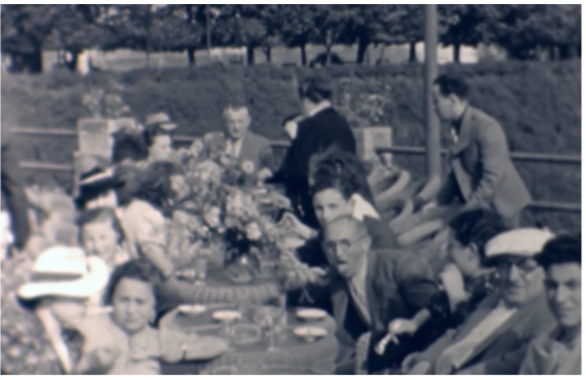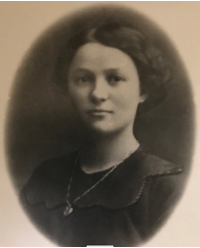I never really thought to ask about my family. I knew that some of us came over from Russia, Ukraine, Poland – but I never suspected there would be any actual answers even if we looked really hard. My grandparents don’t talk about it much, or don’t even know that much. I remember once that I searched up the various family last names on the Auschwitz database (we have a few, seeing as many Jews names were forcibly changed when entering the country because the British authorities couldn’t pronounce them). I had gone on a trip to visit Auschwitz. A number of probable relatives came up on the system. I turned it off – I don’t think I wanted to know, to be honest. But something remarkable happened last term. My mother had been searching a little about her family, and typed in her mother’s maiden name – Bomzon – to Google on a whim. It led to a discovery which has really transformed our lives.

We came across a blog post about “Jewish Plock”, a small town in Poland. Before World War II, it was home to 33,000 people, including 10,000 Jews. The post was about the Bomzon family, and in particular Izrael Abram Bomzon (1861-1913), who was the son of a gingerbread baker. He fell in love with a woman called Jenta who owned the bakery he worked at, and moved in with her in Plosk before having eight children: Bajla Sura, Hersz Fajwel, Dwojra Ides, Estera, Chawa, Brucha, and Chaim. Each and every one of them had the most fascinating lives before the war. I saw pictures of my family there for the first time. They looked uncannily similar to me and to other members of my family – and there was footage of them laughing, smiling, dancing. They sit around a table laid for lunch, their faces looking up at the camera. One can almost hear the cameramen telling them all to pull a silly pose. An entire video of their life in Plock exists, and I am fascinated as I watch them gleefully splash around in the water together in a river nearby as late as August 1937. Of this entire family who remained in Plock, only two survived.

I wanted to understand what happened to each member of the family. Chawa (Eva) left Plock to come to London before the Second World War when she was only 18, and moved to the East End of London, working in a pickle factory. Eva’s siblings remained in Plock. Of Bajla’s eight children, two survived the Holocaust by escaping to Russia in 1940 after the frontier between Poland and the USSR was opened for refugees. It saved their lives. After the War, one of the sisters – Hinda – returned to Plock, where she lived until her death in 2002. So did Estera, who died in 2005. The two sisters are buried there. I have always been fascinated as to why someone would return to this place, so full of family memories, with no family left. Why did they return to the place where their brothers and sisters and parents were taken away to die? If only we had known they existed, maybe we could have spoken to them – we could have heard their stories, including the pain of begging their mother, Bajla, to flee with them, and her telling them that they needed to go, but she couldn’t bear to leave their grandmother Jenta.

The Germans established a ghetto in Plock in September 1940, forcing Jews to live in brutal conditions: Jews had pieces of flesh cut from razor blades, were locked in crates, and thrown down stairs; a Jewish home was forcibly converted into a Nazi brothel where Jewish women were raped; in 1940, all of the mentally ill and terminally ill people were taken to the forest and shot. In 1941, the Plock Jews were all deported. Adam Neuman-Nowicki remembers that “the Nazis hit us with truncheons and rifle butts… old people or sick people who could not climb onto the trucks were shot on the spot…. Jews were leaving Plock forever, the town where their ancestors put down their roots over 700 years ago.” He recalls that one of the mothers, unable to get on the truck whilst holding her baby, left it momentarily in the stroller as she hurried on. A Nazi seized the baby and “threw it to its mother so hard that it was immediately killed.” It wasn’t an isolated occasion–“They took babies away from people and threw them out of windows.” 10,000 Jews from Plock were deported to Działdowo, in trucks where people were strangled and choked to death. For most, this was a transit stage. From 1942, further deportations took place to Auschwitz-Birkenau and Treblinka, where the family was all exterminated.
But each of them must have had their own story. Take, for example, the story of Hersz–Bajla’s brother – who was a member of the revolutionary faction of the Polish Socialist Party and was arrested by the Russian secret police for four years. Or their sister Dwojra, who took on running the family bakery before being deported to Treblinka, and her son Szmył Szłojme (Sam), who was the only member of his family to survive the Holocaust, and emigrated to Los Angeles in 1949. From Estera’s four children, only their son Izrael Abram survived the Holocaust, fleeing to Tel Aviv to become a fruit farmer, where he died in 2003. Of Lejb’s children, one was liberated from Buckenwald in 1945 and had a son– my cousin Arieh, and the writer of the blog post that brought us all together. They emigrated to Australia, and then to Israel–where they still live. We managed to organise one of the most unusual family Zoom calls I have ever experienced, with all of the generations assembled. It was so painful to hear my relatives speak about their lives: the silence and trauma of growing up in a household with parents who were unable to talk to them after facing unimaginable experiences in concentration camps. Yet, for all my family, to find out they had relatives – a whole side of the family that they never knew even existed – was an experience none of us will ever forget.
Image Credit: jewishplock.eu.


